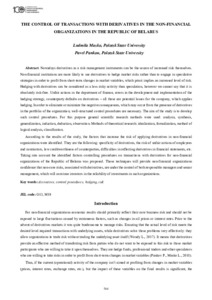Пожалуйста, используйте этот идентификатор, чтобы цитировать или ссылаться на этот ресурс:
https://elib.psu.by/handle/123456789/25243Полная запись метаданных
| Поле DC | Значение | Язык |
|---|---|---|
| dc.contributor.author | Masko, L. | - |
| dc.contributor.author | Pankou, P. | - |
| dc.date.accessioned | 2020-07-01T12:50:29Z | - |
| dc.date.available | 2020-07-01T12:50:29Z | - |
| dc.date.issued | 2019 | - |
| dc.identifier.citation | Masko L. The control of transactions with derivatives in the non-financial organizations in the republic of Belarus/ Ludmila Masko, Pavel Pankou // International Scientific Conference PROCEEDINGS, New Challenges of Economic and Business Development – 2019: Incentives for Sustainable Economic Growth. – pp. 544-555 | ru_RU |
| dc.identifier.uri | https://elib.psu.by/handle/123456789/25243 | - |
| dc.description.abstract | Nowadays derivatives as a risk management instruments can be the source of increased risk themselves. Non-financial institutions are more likely to use derivatives to hedge market risks rather than to engage in speculative strategies in order to profit from short-term changes in market variables, which priori implies an increased level of risk. Hedging with derivatives can be considered as a less risky activity than speculation, however we cannot say that it is absolutely risk-free. Unfair actions in the department of finance, errors in the development and implementation of the hedging strategy, counterparty defaults on derivatives – all these are potential losses for the company, which applies hedging. In order to eliminate or minimize the negative consequences, which may occur from the presence of derivatives in the portfolio of the organization, well-structured control procedures are necessary. The aim of the study is to develop such control procedures. For this purpose general scientific research methods were used: analysis, synthesis, generalization, induction, deduction, observation. Methods of theoretical research: idealization, formalization, method of logical analysis, classification. According to the results of the study, the factors that increase the risk of applying derivatives in non-financial organizations were identified. They are the following: specificity of derivatives, the risk of unfair actions of employees and contractors, low creditworthiness of counterparties, difficulties in reflecting derivatives in financial statements, etc. Taking into account the identified factors controlling procedures on transactions with derivatives for non-financial organizations of the Republic of Belarus was proposed. Those techniques will provide non-financial organizations confidence that non-core risks, associated with derivatives, are under the control of both responsible managers and senior management, which will convince investors in the reliability of investments in such organizations. | ru_RU |
| dc.language.iso | en | ru_RU |
| dc.publisher | University of Latvia | - |
| dc.subject | Derivatives | ru_RU |
| dc.subject | Control procedures | ru_RU |
| dc.subject | Hedging | ru_RU |
| dc.subject | Risk | ru_RU |
| dc.title | The control of transactions with derivatives in the non-financial organizations in the republic of Belarus | ru_RU |
| dc.type | Article | ru_RU |
| dc.identifier.doi | 10.22364/ncebd.2019 | - |
| Располагается в коллекциях: | Публикации в Scopus и Web of Science | |
Файлы этого ресурса:
| Файл | Описание | Размер | Формат | |
|---|---|---|---|---|
| Masko L. The control of transactions with derivatives in the non-financial organizations in the republic of Belarus.pdf | 453.48 kB | Adobe PDF |  Просмотреть/Открыть |
Все ресурсы в архиве электронных ресурсов защищены авторским правом, все права сохранены.